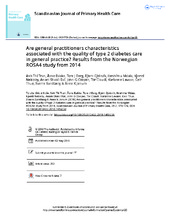Are general practitioners characteristics associated with the quality of type 2 diabetes care in general practice? Results from the Norwegian ROSA4 study from 2014
Tran, Anh Thi; Bakke, Åsne; Berg, Tore Julsrud; Gjelsvik, Bjørn E.; Mdala, Ibrahimu; Nøkleby, Kjersti; Rai, Anam Shakil; Cooper, John; Claudi, Tor; Løvaas, Karianne Fjeld; Thue, Geir; Sandberg, Sverre; Jenum, Anne Karen
Peer reviewed, Journal article
Published version

Åpne
Permanent lenke
https://hdl.handle.net/1956/19106Utgivelsesdato
2018-05-02Metadata
Vis full innførselSamlinger
Originalversjon
https://doi.org/10.1080/02813432.2018.1459238Sammendrag
Objective: To explore the associations between general practitioners (GPs) characteristics such as gender, specialist status, country of birth and country of graduation and the quality of care for patients with type 2 diabetes (T2DM). Design: Cross-sectional survey. Setting and subjects: The 277 GPs provided care for 10082 patients with T2DM in Norway in 2014. The GPs characteristics were self-reported: 55% were male, 68% were specialists in General Practice, 82% born in Norway and 87% had graduated in Western Europe. Of patients, 81% were born in Norway and 8% in South Asia. Data regarding diabetes care were obtained from electronic medical records and manually verified. Main outcome measures: Performance of recommended screening procedures, prescribed medication and level of HbA1c, blood pressure and LDL-cholesterol stratified according to GPs characteristics, adjusted for patient and GP characteristics. Result: Female GPs, specialists, GPs born in Norway and GPs who graduated in Western Europe performed recommended procedures more frequently than their counterparts. Specialists achieved lower mean HbA1c (7.14% vs. 7.25%, p < 0.01), a larger proportion of their patients achieved good glycaemic control (HbA1c = 6.0%–7.0%) (49.1% vs. 44.4%, p = 0.018) and lower mean systolic blood pressure (133.0 mmHg vs. 134.7 mmHg, p < 0.01) compared with non-specialists. GPs who graduated in Western Europe achieved lower diastolic blood pressure than their counterparts (76.6 mmHg vs. 77.8 mmHg, p < 0.01). Conclusion: Several quality indicators for type 2 diabetes care were better if the GPs were specialists in General Practice.
